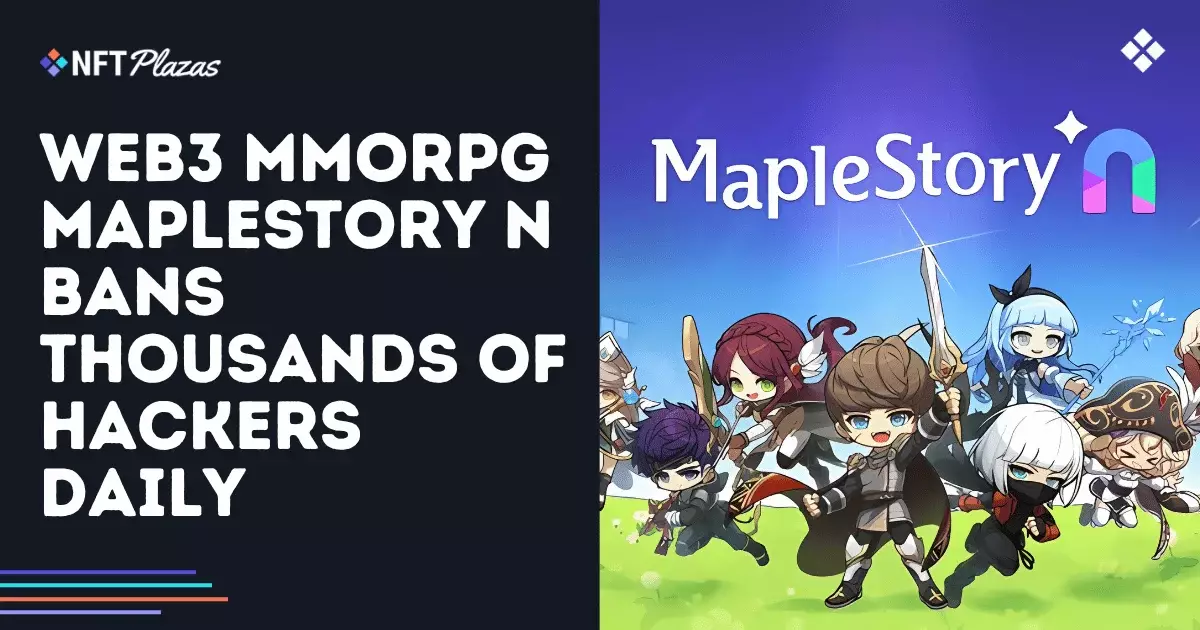The launch of NFT games has already stirred a mix of excitement and skepticism within the gaming community, and nowhere is this more pronounced than in the MMORPG MapleStory N. Since its debut, it has faced significant challenges including rampant cheating, botting, and exploitation, which have drawn attention to serious flaws that threaten to undermine the integrity of not just this game, but potentially the entire NFT gaming ecosystem. Nexpace, the developer, is currently taking drastic measures, banning thousands of accounts daily in a desperate bid to salvage what is left of a fair gaming experience. This situation begs the question: Can NFT gaming environments survive if they cannot maintain a secure and honest playing field?
Automation and Exploitation: A Perfect Storm
The allure of NFT gaming lies in the potential for players to earn cryptocurrency through gameplay, yet this very characteristic has attracted a swarm of dishonest actors intent on exploiting the system. By deploying automated bots to farm invaluable in-game items, these cheaters are circumventing the core essence of fair competition. Nexpace has responded with a plethora of measures aimed at detection and deterrence, but one cannot ignore how easily technology can be weaponized. The battle against these exploiters resembles a never-ending cat-and-mouse game, raising concerns about the viability of NFT games that hinge on decentralized and open mechanics.
Interestingly, while Nexpace has emphasized the breakdown of in-game economies due to cheating, they note that the abusers tend to spend more than they are able to extract. This paradox raises important questions: Are these exploits merely a flash-in-the-pan irritant, or do they portend a more significant crisis? If the very architecture of the game is leading users to dig deeper into their pockets without a corresponding return, what does that say about the game’s sustainability in the long run?
Regulatory Measures: A Double-Edged Sword
To combat the surge in cheating, Nexpace has employed various protective measures, including withdrawal delays, enhanced cheat detection systems, and economic restrictions on asset movement. The introduction of a 30-hour delay on withdrawals aims to thwart illicit activity by allowing time for detection, while simultaneously serving as a cautionary sign that the developers are working to protect the integrity of the game. However, while these precautions may reduce abuse rates, they inadvertently affect legitimate players, leading to a broader sense of frustration within the community.
Is this draconian approach necessary for the greater good? In the center-right liberal tradition, one could argue that excessive regulation stifles innovation and freedom. Limiting player engagement with such barriers may ultimately serve to push away the invested community that the developers seek to retain. When enforcement measures alienate users, the question stands—where is the balance between maintaining a fair environment and preserving player autonomy?
The Community’s Role in Enforcement
Another critical aspect of Nexpace’s strategy is their recognition of the community’s potential role in detecting and reporting exploitative behavior. Player involvement is essential for identifying suspicious activities, encouraging a shared sense of responsibility within the gaming ecosystem. Yet, this reliance on community policing introduces its own challenges, including crowd mentality and bias, which could unfairly target innocent players while allowing skilled cheaters to slip through the cracks.
The proposed clawback mechanism to reclaim assets from banned accounts shows a commitment to communal accountability, albeit within a tightly controlled framework. However, enacting such measures only when the community agrees can lead to an impasse when action is needed urgently. Moreover, it raises ethical concerns about ownership in a gaming space that prides itself on decentralization and player empowerment.
Looking Forward: The Future of Trust in NFT Gaming
As MapleStory N navigates these problematic waters, the overarching concern remains clear: Can integrity be restored in an environment increasingly dominated by dishonesty? Nexpace’s top-down regulations and community involvement strategies are commendable but may not be enough to underpin a trust-based gaming culture. The future of NFT games will depend on finding innovative solutions that protect players and prevent exploitation without sacrificing the core values that attract them in the first place. The stakes have never been higher; the push for an equitable gaming experience may very well determine the long-term loyalty of the player base.

